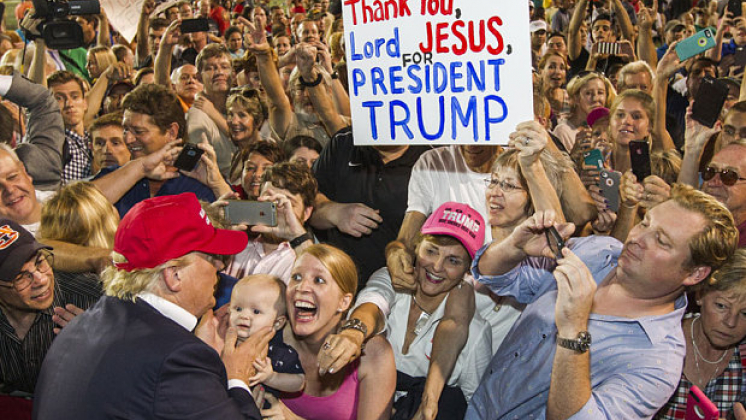Economics and Trump's rise
It is undoubtedly scary to many people living outside the United States to see Donald Trump as the leading candidate for the Republican presidential nomination. He has repeatedly made xenophobic and racist comments and promises to deport 11 million people who immigrated to the United States without proper documentation. This should provide cause for concern, but it is important to understand the basis of Trump’s appeal.
First, Trump’s support is coming overwhelmingly from white men with less than a college education. These are people who likely see themselves as losers in the economy over the last few decades. While an earlier generation of non-college educated white men could count on a reasonably good paying job in manufacturing, trucking, and other sectors requiring limited education, this is no longer true. Pay for men without college degrees has been largely stagnant over the last thirty five years.
These men are angry about not enjoying the living standard and economic security that their parents could largely take for granted. This leaves them look for villains to blame, real or imagined.
Immigrants figure high in the imagined category. While there are undoubtedly narrow categories of native-born workers who have seen a drop in their wages and job prospects due to immigration, most research shows that immigrants overwhelmingly compete with other immigrants.
Much of Trump’s appeal has been his hardline stance on immigrants. Everyone seriously thinking about immigration policy recognizes the implausibility of Trump’s mass deportation strategy. Many of these immigrants have lived in the United States for decades. They have held jobs, bought homes, raised children and started businesses. While Democrats have generally supported an approach that allows undocumented immigrants a path to citizenship, so have prominent Republicans like President George W. Bush and Senator John McCain, the 2008 Republican presidential nominee. Trump obviously rejects this approach.
Trump’s agenda is a bit more grounded in reality when it comes to trade. There is now substantial evidence that trade has been an important factor in depressing wages for large segments of the workforce, so Trump and his supporters are on the right track in complaining about the pattern of trade over the last three decades.
However Trump is wrong in his analysis of the problem. He argues that the United States has essentially been ripped off by China and other U.S. trading partners because the people negotiating the trade deals are stupid. He claims that his experience as a successful businessman will enable him to negotiate deals with China and other countries that actually benefit the United States.
In fact the U.S. trade negotiators are not stupid; they just have a different agenda. Low cost imports from China and other developing countries allow Walmart and other large retailers to undercut competitors that are more dependent on domestic producers. U.S. manufacturers also have taken advantage of low cost labor to reduce their production costs.
For this reason, U.S. trade negotiators are not focused on reducing the U.S. trade deficit in manufactured goods. Instead they are concerned about extending patent and copyright protection and opening markets for the U.S. financial industry.
Trump’s positions on immigration and trade are not the only places where he departs from the mainstream of the Republican Party. He also strongly defends Social Security and Medicare. Republicans have long sought to cut and/or privative these programs. Trump insists that we can afford these programs if the economy was better managed. This position is hugely popular with the bulk of Republican voters, who are disproportionately older, even if it goes against the views of its leadership and its large donors.
As the race moves along, Trump is increasingly well-situated to be the nominee. When he first entered the race, few analysts took his campaign seriously. He had long been a prominent public figure, first because of his high profile real estate deals and then for being the star of a reality television show. While this gave him an enormous advantage in name recognition, it was generally assumed that voters would not take him seriously as presidential candidate.
To the surprise of the experts, Trump surged to the top of the polls and stayed there. This was in spite of the fact that he repeatedly made comments that would be considered horrible gaffes, in which offended one group of voters after another. Remarkably, after each comment his standing in the polls did not change. Apparently many Trump supporters admire him because of his willingness to be offensive.
With the primaries now underway, Trump is rapidly accumulating Republican delegates and still has a strong lead in all national polls. It is difficult to see a scenario in which he does not get the Republican presidential nomination.
The flip side of Trump’s strong position for getting nomination is that it still seems unlikely that he will win the presidency. He is hugely unpopular among Democrats and people who consider themselves independents.
Whatever the final outcome of the presidential race, Trump has exposed a sense of extreme anger among large segments of the population. These people are unhappy about economic policies that have undermined their financial security. Their anger may be misdirected towards immigrants or other countries, but it is not about to go away unless the policies the change.
By Dean Baker, co-director of the Center for Economic and Policy Research


